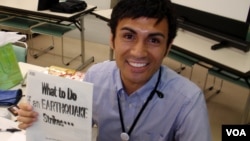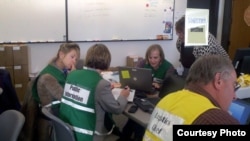VANCOUVER, Washington — On March 11 last year, Kaleb Urike was in Sendai, Japan, organizing a fundraiser for victims of the February earthquake in his hometown of Christchurch, New Zealand. Then the earth there, in northeast Japan, began to shake with a magnitude 9.0 quake.
"It lasted for five minutes," Urike remembers. "We had to evacuate and go outside. Then it just started snowing for 30 minutes. That's all I remember, being cold."
The recent university graduate was unhurt. His first instinct was to locate the other foreign workers who, like himself, live in Sendai. But the electricity was out and would remain so for the next three days. Phone lines were inoperable or jammed. According to Urike, cellular service and mobile data came back first.
"A lot of people could use their smartphones," he says. "So they accessed Facebook and would update to say that they're OK."
Google in time of crisis
Urike also made sure his survivor status was posted on Google Person Finder. Google activated this temporary Internet database to help friends and relatives find missing people in Japan’s disaster zone.
"In times of crisis, people will go to the tools that they know and use regularly," says Christiaan Adams, a software developer with Google's in-house crisis response team. "In their daily lives, people use Google Search. They use Google Maps. These are the places they go for information."
Adams' company is taking on functions traditionally performed by local government or the Red Cross. He says Google isn't trying to be an alternative to official sources, but rather hopes to make those sources more effective.
"Technology is changing so quickly these days that it's hard for anybody to keep up with the new ways of doing things and the best and latest ways of publishing data," Adams says. "So we try to work with many organizations to help them do that better and to get their information out."
Google Person Finder accumulated more than 600,000 records pertaining to the Japanese earthquake and tsunami, according to Adams. "The Japanese Red Cross collected 200,000. One difference is that the Red Cross verifies entries to its missing persons database, while Google does not.
Government jumps onto social media platforms
Government agencies have been slower to jump onto social media platforms than the private sector. Among recent converts are some wildfire incident commanders in the American West.
Kris Eriksen, a public information officer for the U.S. Forest Service, says this summer, social media allows her to listen and respond from the fire command post in ways she never could before.
"We can sort of hear over-the-backyard-fence discussions among neighbors," she says. "We can join groups. We can hear discussion groups and blogs. And we can get a sense or a pulse of the community and how it is feeling about our response efforts."
Change is also coming to local emergency operations centers in the USA. In a major disaster, the center in Vancouver, Washington, now has several work stations dedicated to staying on top of Twitter, YouTube, public posts on Facebook and other social media sites.
Emergency manager Cheryl Bledsoe says those channels can provide real-time information from what is basically an army of citizen journalists. "They're seeing something on fire and taking pictures of it. It gives us a much better picture in here of what the disaster looks like outside these four walls."
Bledsoe has two computer monitors on her desk where she scans and sorts multiple incoming streams of Internet chatter with practiced ease.
Xbox emergency alert?
During a big emergency, she hopes Facebook and Twitter users collaborate to solve some problems themselves, without drawing on over-extended emergency responders.
Later this year, the American Red Cross plans to start training so-called "digital volunteers," who could support an understaffed jurisdiction in a future crisis.
Bledsoe notes that despite the growing popularity of smartphones and social media platforms, not everyone would have access to these technologies during a crisis.
"We still use emergency alert systems, which go out through radio and television broadcast," she says. "A lot of that is changing to where it is gathering in some new forms of technology. So even gaming systems, like the Xbox, are being looked at as a provider of emergency alerts."
Of course, the Xbox, televisions and the Internet require electricity, which may be out during emergencies. So that battery-powered radio is still part of the plan almost everywhere.
"It lasted for five minutes," Urike remembers. "We had to evacuate and go outside. Then it just started snowing for 30 minutes. That's all I remember, being cold."
The recent university graduate was unhurt. His first instinct was to locate the other foreign workers who, like himself, live in Sendai. But the electricity was out and would remain so for the next three days. Phone lines were inoperable or jammed. According to Urike, cellular service and mobile data came back first.
"A lot of people could use their smartphones," he says. "So they accessed Facebook and would update to say that they're OK."
Google in time of crisis
Urike also made sure his survivor status was posted on Google Person Finder. Google activated this temporary Internet database to help friends and relatives find missing people in Japan’s disaster zone.
"In times of crisis, people will go to the tools that they know and use regularly," says Christiaan Adams, a software developer with Google's in-house crisis response team. "In their daily lives, people use Google Search. They use Google Maps. These are the places they go for information."
Adams' company is taking on functions traditionally performed by local government or the Red Cross. He says Google isn't trying to be an alternative to official sources, but rather hopes to make those sources more effective.
"Technology is changing so quickly these days that it's hard for anybody to keep up with the new ways of doing things and the best and latest ways of publishing data," Adams says. "So we try to work with many organizations to help them do that better and to get their information out."
Google Person Finder accumulated more than 600,000 records pertaining to the Japanese earthquake and tsunami, according to Adams. "The Japanese Red Cross collected 200,000. One difference is that the Red Cross verifies entries to its missing persons database, while Google does not.
Government jumps onto social media platforms
Government agencies have been slower to jump onto social media platforms than the private sector. Among recent converts are some wildfire incident commanders in the American West.
Kris Eriksen, a public information officer for the U.S. Forest Service, says this summer, social media allows her to listen and respond from the fire command post in ways she never could before.
"We can sort of hear over-the-backyard-fence discussions among neighbors," she says. "We can join groups. We can hear discussion groups and blogs. And we can get a sense or a pulse of the community and how it is feeling about our response efforts."
Change is also coming to local emergency operations centers in the USA. In a major disaster, the center in Vancouver, Washington, now has several work stations dedicated to staying on top of Twitter, YouTube, public posts on Facebook and other social media sites.
Emergency manager Cheryl Bledsoe says those channels can provide real-time information from what is basically an army of citizen journalists. "They're seeing something on fire and taking pictures of it. It gives us a much better picture in here of what the disaster looks like outside these four walls."
Bledsoe has two computer monitors on her desk where she scans and sorts multiple incoming streams of Internet chatter with practiced ease.
Xbox emergency alert?
During a big emergency, she hopes Facebook and Twitter users collaborate to solve some problems themselves, without drawing on over-extended emergency responders.
Later this year, the American Red Cross plans to start training so-called "digital volunteers," who could support an understaffed jurisdiction in a future crisis.
Bledsoe notes that despite the growing popularity of smartphones and social media platforms, not everyone would have access to these technologies during a crisis.
"We still use emergency alert systems, which go out through radio and television broadcast," she says. "A lot of that is changing to where it is gathering in some new forms of technology. So even gaming systems, like the Xbox, are being looked at as a provider of emergency alerts."
Of course, the Xbox, televisions and the Internet require electricity, which may be out during emergencies. So that battery-powered radio is still part of the plan almost everywhere.





